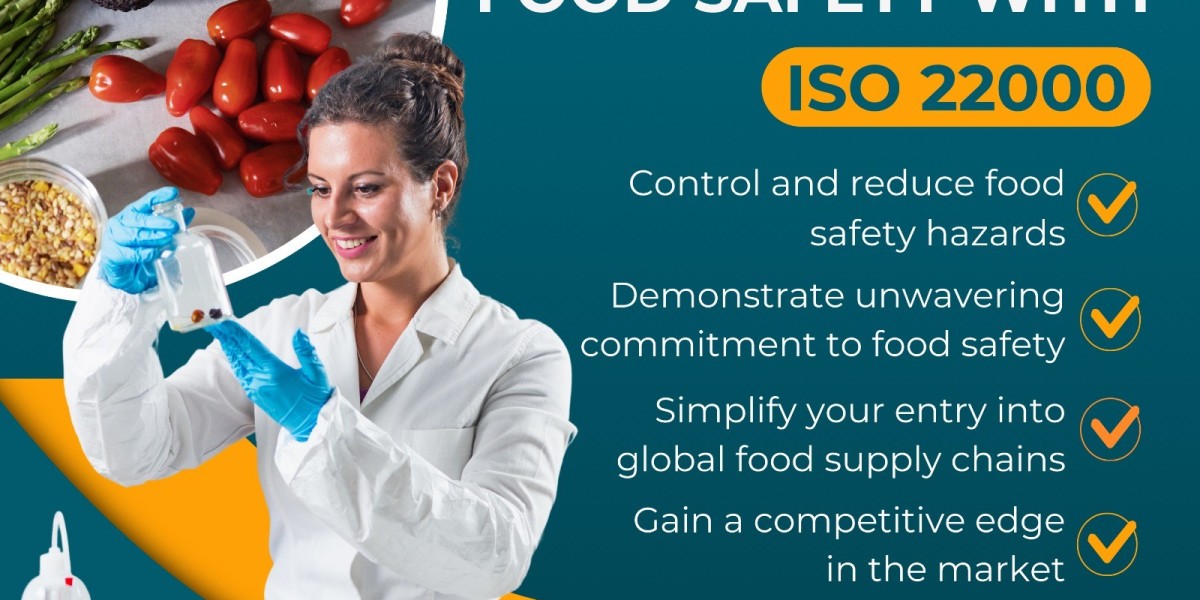ISO 22000 is the international standard for food safety management systems (FSMS), applicable to any organization involved in the food chain. Whether you’re a farmer, processor, distributor, or retailer, ISO 22000 helps you build a robust system that ensures food safety at every stage.
What is ISO 22000?
ISO 22000 is developed by the International Organization for Standardization and combines the core elements of ISO 9001 with Hazard Analysis and Critical Control Points (HACCP). It’s designed to ensure food safety from farm to fork by identifying potential hazards and implementing controls to prevent contamination.
Organizations that achieve ISO 22000 Certification in Nigeria prove they have a management system in place that ensures food is safe for consumption and meets regulatory and customer requirements.
Why ISO 22000 Matters in Nigeria
Nigeria’s food and agriculture sector is vast, diverse, and crucial to the economy. However, challenges such as inconsistent hygiene practices, lack of standardized processes, and inadequate quality controls can affect food safety and damage consumer trust.
ISO 22000 in Nigeria provides a standardized framework to address these issues. It helps businesses:
Prevent foodborne hazards
Improve traceability and accountability
Comply with local and international regulations
Enhance customer confidence
Whether you operate a local food processing plant or export agricultural products, ISO 22000 certification boosts your reputation and opens access to global markets.
Key Benefits of ISO 22000 Certification in Nigeria
Enhanced Food Safety: Establishes preventive controls and ensures compliance with legal and regulatory requirements.
Improved Operational Efficiency: Streamlines processes, reduces waste, and minimizes rework due to contamination.
Market Access: Required by many international buyers and supply chains, especially for exports.
Customer Trust: Demonstrates a proactive commitment to food safety and quality.
Compliance Assurance: Helps meet requirements from regulatory bodies such as NAFDAC and SON.
Steps for ISO 22000 Implementation in Nigeria
Implementing ISO 22000 involves setting up a documented food safety management system that aligns with the standard. The process typically includes:
Gap Analysis – Compare existing practices with ISO 22000 requirements.
System Development – Establish policies, objectives, and procedures.
Training & Awareness – Educate employees at all levels.
Hazard Analysis – Identify and evaluate potential food safety hazards.
Monitoring & Verification – Use controls and KPIs to ensure effectiveness.
Internal Audit & Management Review – Prepare for third-party assessment.
Certification Audit – An accredited body conducts the final audit.
Engaging professional ISO consultants can help simplify and accelerate the process.
Finding the Right ISO 22000 Consultants in Nigeria
Working with experienced ISO 22000 Consultants in Nigeria is key to successful certification. These experts bring deep knowledge of the standard and local regulatory landscape. They help with:
System design and documentation
Staff training and workshops
Pre-certification audits
Liaising with certification bodies
Choose consultants who have a proven track record in the food industry and offer tailored solutions for your business size and type.
What Does ISO 22000 Cost in Nigeria?
The ISO 22000 Cost in Nigeria depends on several factors:
The size and complexity of your organization
Current level of food safety practices
Scope of operations and number of sites
Type of certification body chosen
While the upfront cost may vary, the long-term benefits—including reduced risk, enhanced efficiency, and market access—far outweigh the investment.
ISO 22000 Audit in Nigeria: What to Expect
The ISO 22000 Audit in Nigeria involves a thorough review of your FSMS, policies, records, and operations to ensure compliance with the standard. The audit typically has two stages:
Stage 1: Review of documentation and readiness
Stage 2: On-site evaluation of food safety controls and practices
Surveillance audits are conducted annually to ensure continuous compliance and improvement.
Conclusion: A Safer, Stronger Food IndustryIn an era where consumers demand transparency and accountability, ISO 22000 Certification in Nigeria empowers food businesses to rise above the competition. It’s not just about meeting standards—it’s about building a culture of food safety and excellence that benefits your customers, your brand, and your bottom line.
With professional support from ISO 22000 Consultants in Nigeria, your business can implement a world-class food safety management system and take confident steps toward sustainable success.








